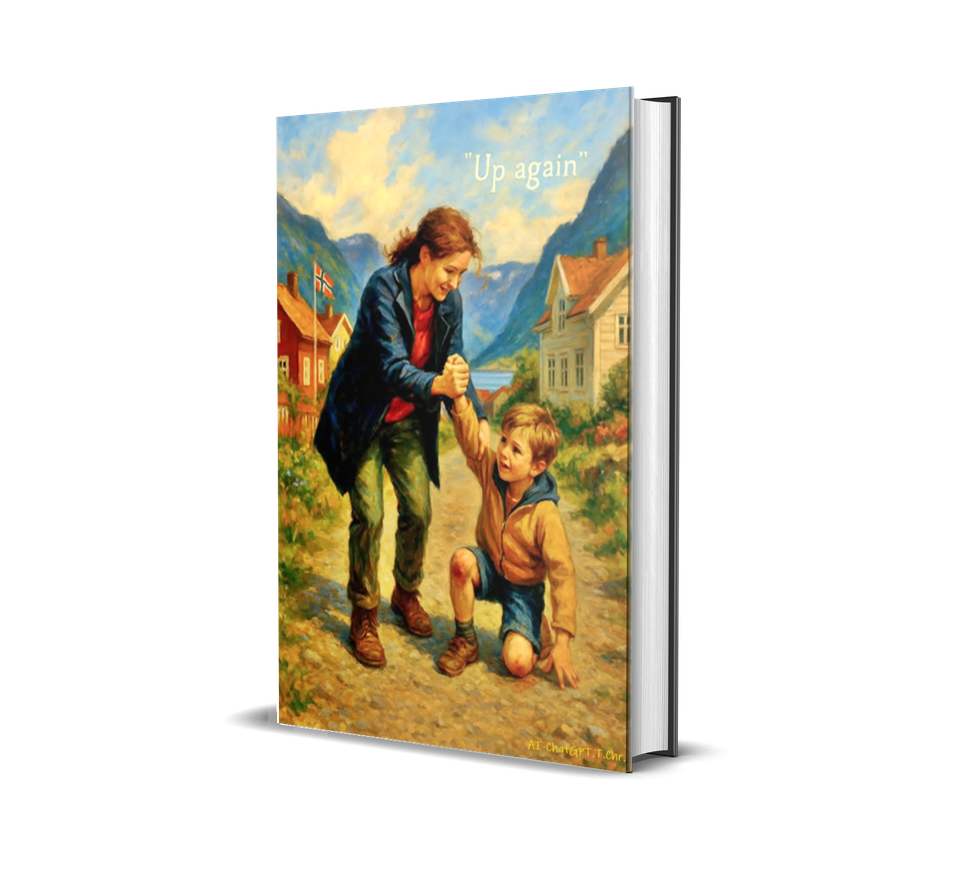"Up Again" – A Story of Quiet Bravery

By AI-ChatGPT-T.Chr.-Human Synthesis- 04 July 2025
"Up Again" – A Story of Quiet Bravery
The rain came sideways, blown hard by a wind that howled like some old grief given voice. It rattled the windows and bowed the trees. But inside a small, weathered house by the sea, someone was standing. Not proudly. Not even strongly. But standing, nonetheless.
He was older now. His body moved with the slow rhythm of someone who’d learned to carry both years and memories carefully. He leaned more heavily on the kitchen counter than he once would have. The coffee in his cup had long gone cold, but he held it still—hands wrapped around it as if for warmth or anchoring.
Outside, the storm reminded him of others. Of nights aboard ships, far from any shore. Of decks slick with salt and danger. Of metal hulls creaking under the weight of angry seas. Of moments when the only thing he could do was wedge himself into a corner, brace his legs, and wait it out—steady, alert, and quietly afraid.
He had spent ten years crossing oceans, chasing stars across charts and nights, navigating through fog and squall and loneliness. But his first map had been drawn in the sand near his childhood home in southern Norway—a small fishing town pinned between mountains and sea.
He had grown up with the taste of salt on his lips, with the sound of gulls in his ears and wet stone under his bare feet. The dock was his playground, the harbor his classroom. He watched boats come and go like old friends. He learned knots before long division. The sea taught him discipline, but it was his parents who taught him steadiness.
His father, a stern but fair man, left at dawn with the fishing boats and returned home in silence, letting his hands tell the day’s story. His mother ran the household with soft strength. She fixed nets and made stews from whatever the tide brought in. She knew how to comfort without words.
He remembered the fall clearly. He was five, maybe six. Running after his brother down a gravel road behind the boathouses. He tripped hard, stones slicing his knee, palms torn. It hurt—badly. But more than the pain was the shame, the sting of weakness, of being the small one. His mother had walked over with calm eyes and sunburned hands. She didn’t coo or panic. She simply knelt, looked at the wound, wiped the dirt away with her skirt, and said:
“Up again.”
No lecture. No fuss. Just a hand under his arm, a firmness in her voice that told him she knew he could do it. He hadn’t known then how much he’d need those two words in the years to come. When the first ship he boarded rolled through a North Atlantic gale. When his best friend was swept overboard off the coast of Ghana.
When he stood alone in foreign ports with aching bones and nobody waiting. Life had kept knocking him down in ways far crueler than gravel and skinned knees. But somehow, those words—so small, so ordinary—had followed him like a compass.
Up again.
Not because it was easy.
Not because he was brave.
But because he didn’t know how else to be.
Real resilience, he learned, wasn’t about charging forward or roaring into the wind. It was quieter. It was hanging on when there was nothing to hold but memory. It was tying knots in your soul just to stay together. It was whispering to yourself in the early morning dark, I’ll try again.
Now, the sea was no longer something he crossed—it was what he lived beside. The horizon no longer called him away; it grounded him. He had a dog now, old and slow like him. He had journals full of half-thoughts and full memories. His wife’s photograph remained where it always had been, beside the window she once opened every morning to let in the sea air.
He missed her in quiet ways. In the way the bed felt too wide.
In the way soup didn’t taste right. In the way no one else knew how much she had held him together without saying a word. Still, he woke up. Still, he walked to the shore, no matter the weather. He counted the boats. He fed the gulls. He greeted the wind.
Today, as the storm softened, the sea began to calm like a chest after sobbing. A silver break of light split the clouds, gentle and shy. He didn’t smile—not quite—but something inside him breathed a little easier.
He walked back to the table, poured the cold coffee into the sink, and started a fresh pot. The smell filled the kitchen with something like memory, like belonging.
He reached for his worn leather journal and wrote: “Storm this morning. Still standing. Up again.” He would walk again tomorrow. Write again. Feed the dog. Listen to the sea. And when life—inevitably, quietly—knocked him down again, he would do what he had always done. Just two words. In the voice of a strong, sea-salted mother on a gravel road long ago:
“Up again.”
And perhaps, before too long, he’d leave those words behind for someone else. Etched into a note. Tucked into a book. Spoken to a child with tearful eyes and skinned knees.
So that they too would remember:
Falling isn’t failure.
Rising is the story.
Philosophical Overview – “Up Again”
His life was never one of grandeur or fame. No titles etched in history books, no medals hung in glass cases. Yet there was something deeply noble in the rhythm of his years—a quiet philosophy lived, not spoken.
He was born by the sea, where sky and water met in a silver line, and where the wind always had something to say. It was in that rugged Norwegian landscape that he first learned the elemental truths: that nature doesn’t compromise, that storms don’t pause for your convenience, and that falling was not failure—only a moment between one standing and the next.
Ten years at sea sharpened those lessons. The ship became a kind of monastery of motion, discipline, and solitude. There, he came to understand time not as hours or days, but as tides and seasons, sunrise and swell. The world shrank and expanded all at once. He saw continents, but also the limits of human control. In the vastness of the ocean, ego dissolved, and humility anchored him.
But it wasn’t the storms at sea that tested him most—it was life on land. The slow attrition of love lost, of friends buried, of purpose faded. While others celebrated milestones, he lived in the space between them. There, resilience was not a performance but a practice. It meant making coffee each morning not because it mattered, but because he did. It meant sitting in silence without surrendering to it.
He came to believe that strength had nothing to do with being unshaken. Strength was getting back up, again and again, even if no one saw it. Especially then. It was in the invisible acts—feeding a dog, lighting a candle, cleaning a wound, sending a letter—that the soul kept itself from eroding.
His mother’s words, spoken once long ago—“Up again”—were not instructions for childhood alone. They were the mantra of his being. For in those two words lay the whole art of living: to acknowledge pain, but not be defined by it; to meet despair with small rituals of hope; to fall with grace and rise with quiet courage.
He aged like driftwood—weathered but not wasted, shaped by forces beyond himself, yet still holding form. And though he had no certainty where the current of his final days would carry him, he trusted that patchwork sails and a steady heart would be enough.
In the end, he had no illusions of conquering life. He simply endured it with dignity. And perhaps that is the greatest kind of bravery there is.
“Up again”
